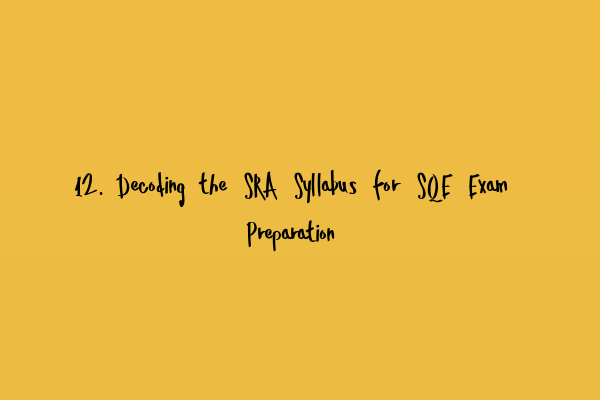Decoding the SRA Syllabus for SQE Exam Preparation
Preparing for the Solicitors Qualifying Exam (SQE) can be a daunting task. With the new assessment format introduced by the Solicitors Regulation Authority (SRA), it is important for aspiring solicitors to understand the SRA syllabus in order to effectively prepare for the exam. In this article, we will decode the SRA syllabus and provide valuable insights and tips for SQE exam preparation.
1. Understanding the SQE Exam Format
Before delving into the details of the SRA syllabus, it is crucial to have a clear understanding of the SQE exam format. The SQE consists of two stages: SQE1 and SQE2. SQE1 focuses on the application of legal knowledge and comprises multiple-choice questions and written tasks. SQE2, on the other hand, is a skills-based assessment that tests practical legal skills through simulated tasks.
To maximize your chances of success, it is important to familiarize yourself with the format of each stage and the specific skills and knowledge assessed.
2. Analyzing the SRA Syllabus
The SRA syllabus is divided into three key areas: Business Law and Practice, Dispute Resolution, and Property Practice. Each area is further broken down into specific topics that aspiring solicitors need to study and understand.
Let’s take a closer look at each area:
2.1 Business Law and Practice
This area covers topics such as contract law, company law, and employment law. It is essential to have a strong foundation in these areas, as they form the backbone of legal practice in a business context. Understanding the intricacies of contract formation and the rights and responsibilities of both parties will be crucial in the SQE exam.
To enhance your preparation in this area, consider attending webinars or training sessions focused on business law and practice. These resources can provide valuable insights and expert guidance on the key concepts and practical application of the law.
SQE webinars are an excellent way to access expert insights and stay up to date with the latest developments in business law and practice.
2.2 Dispute Resolution
The dispute resolution area covers topics such as civil litigation, criminal litigation, and alternative dispute resolution. As a solicitor, you will often find yourself involved in various forms of dispute resolution, whether it’s representing clients in court or negotiating settlements.
It is crucial to have a deep understanding of the civil and criminal litigation processes, as well as the key principles of alternative dispute resolution methods such as mediation and arbitration.
To gain a comprehensive understanding of this area, it is recommended to review materials and resources offered by reputable SQE course providers. These resources will cover the essential topics and provide valuable practice questions to test your knowledge.
SQE course providers offer comprehensive study materials and resources tailored to help you succeed in the dispute resolution area of the SQE exam.
2.3 Property Practice
The property practice area focuses on real estate law, including topics such as land law, conveyancing, and landlord and tenant law. As a solicitor, you will often encounter property-related matters, whether it’s assisting clients with property transactions or resolving disputes between landlords and tenants.
A strong foundation in property law is essential to tackle the property practice area of the SQE exam. It is important to understand the intricacies of land law, including the different types of property rights, land registration, and leases.
Additionally, developing practical skills in conveyancing, such as drafting contracts and conducting property searches, will be crucial for success in this area.
3. Essential Study Tips for SQE Exam Preparation
Now that we have explored the key areas of the SRA syllabus, let’s discuss some essential study tips to maximize your SQE exam preparation:
3.1 Start Early and Create a Study Plan
Preparing for the SQE exam requires time and dedication. Start your preparation early and create a study plan that outlines your daily, weekly, and monthly study goals. Be sure to allocate sufficient time to revise each area of the syllabus and allow for regular practice to reinforce your knowledge.
3.2 Practice, Practice, Practice
The SQE exam is not only about theoretical knowledge but also about practical application. Enhance your preparation by practicing multiple-choice questions, written tasks, and simulated practical assessments. This will help you develop the necessary skills and familiarize yourself with the format and style of the exam.
Check out our article on SQE insider tips and study tricks for more guidance on effective exam preparation strategies.
3.3 Seek Expert Guidance
Don’t hesitate to seek expert guidance and support throughout your SQE exam preparation journey. Webinars, workshops, and courses offered by experienced professionals can provide valuable insights and help you refine your understanding of the SRA syllabus. They can also provide expert feedback and guidance on your practice assessments.
4. Stay Updated with the Latest Developments
As the legal profession continues to evolve, it is important to stay updated with the latest developments and changes in the law. Keep an eye on legal news and publications to learn about recent cases, legislative amendments, and emerging legal trends. This will not only enhance your knowledge but also demonstrate your commitment to the profession.
Understanding the grading system in SQE can provide you with an insight into how your performance will be assessed in the exam.
Conclusion
Decoding the SRA syllabus for SQE exam preparation is the key to success. By understanding the key areas and topics of the syllabus, creating a study plan, practicing effectively, and seeking expert guidance, you can position yourself for success in the SQE exam.
Remember, preparation is the key to success. Stay focused, stay motivated, and trust in your abilities. Good luck!
